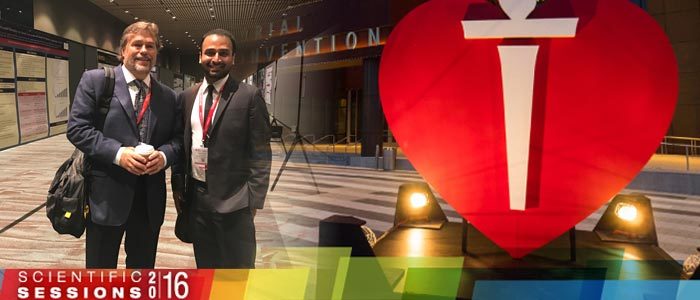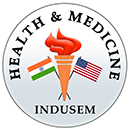INDUSEM Leaders Professor Gaieski and Dr. Bhardwaj achieved great accolades when they actively participated and presented their work at the Scientific Sessions of the American Heart Association in 2016.
Dr. David Gaieski from the Thomas Jefferson University was the recipient of the INDUSEM 2016 Shri. Tarseem Garg Oration and Key Note Address speakership. He is a world leader in Resuscitation Science and his research actively contributes to the progressing science of resuscitation.
Dr. Gaieski’s clinical and research fields of interest include the use of ECMO as a rescue strategy for patients in refractory cardiac arrest (ECPR), optimal cardiopulmonary resuscitation, and bundled post-Cardiac Arrest care centered on Therapeutic Hypothermia (Targeted Temperature Management), but also including early percutaneous coronary interventions, hemodynamic optimization, neuroprognostication after cardiac arrest. He is also interested in severe sepsis/septic shock management, including early detection, early antibiotics, optimal resuscitation, and prevention of readmission and long-term sequelae. He has extensive experience in these fields and has published more than 120 peer-reviewed articles.
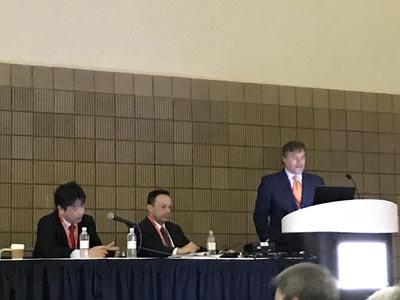
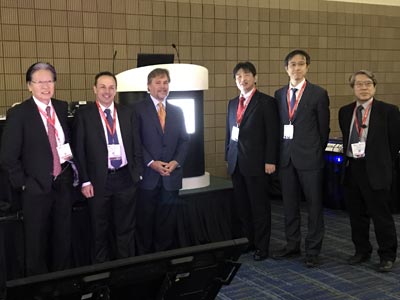
At the Resuscitation Science Symposium (ReSS) Dr. Gaieski spoke about “The U.S approach to Extracorporeal CPR (ECPR) implementation and training” at the joint AHA/Japanese Circulation Society Session. He shared the stage with Dr. Endo, the inventor of the “Endo-System”, a low-cost vascular cannulation device used in ECMO simulation training.
He also moderated a poster session on optimizing CPR, facilitating lively discussion with young researchers at ReSS.
Dr. Gaieski was also involved in multiple studies and had his multiple research studies presented at the AHA Scientific Sessions.
Dr. Abhishek Bhardwaj from UPenn was one of the key leaders in organizing the International SHOCK Symposium at INDUSEM2016.
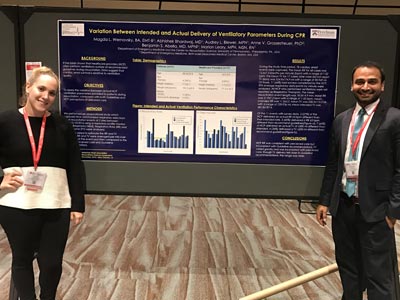
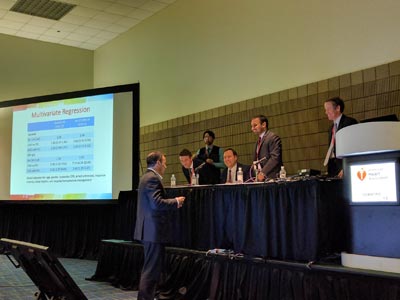
In his current role as a resuscitation fellow and as a medical ICU attending at the University of Pennsylvania, Dr. Bhardwaj is primarily interested in high quality cardiopulmonary resuscitation(CPR), cardiac arrest, and post-cardiac arrest care. He is currently looking at the incidence of re-arrest after successful return of spontaneous circulation (ROSC). His next project is studying mechanical CPR devices during in-hospital cardiac arrest. His secondary clinical and research interest include sepsis and septic shock management and the role of VV-ECMO in ARDS. He is also working on a research collaboration with physicians in India.
At the Resuscitation Science Symposium (ReSS), AHA, Dr. Bhardwaj moderated the session where speakers from Sweden, Taiwan and United States presented their work on Telephone directed CPR, relationship between Coronary Angiography and outcomes of out of hospital cardiac arrest (OHCA) and Statin use and outcomes in OHCA.
Dr. Bhardwaj was also involved in a poster presentation regarding variations in ventilatory parameters during CPR.
“It is a proud moment for all at INDUSEM. The mentorship of Professor Gaieski and the ground game of Dr. Bhardwaj will play an important role as INDUSEM Moves to set up the First Resuscitation Sciences Network in Asia. The Research Infrastructure and vision of these leaders is not only changing concepts across the world but also inspiring young academicians in India. Congratulations to both these leaders.” Said INDUSEM CEO Dr. Sagar Galwankar.
The American Heart Association (AHA) Scientific Sessions 2016 was organized by American Heart Association (AHA). This is an annual academic activity. The 2016 event was held from Nov 12 – 16, 2016 at Ernest N. Morial Convention Center, New Orleans, Louisiana, United States Of America. The target audience was Physicians, Physician Assistants, Nurse Practitioners, Nurses, Pharmacists. This event was contianing five days of the best in science and cardiovascular clinical practice covering all aspects of basic, clinical, population and translational content. The scope and quality of the scientific exchange made Scientific Sessions the premier cardiovascular research and instructional meeting in the world. Programming was designed to improve patient care by communicating the most timely and significant advances in basic, clinical, translational and population health research, spanning the full spectrum of cardiovascular disease from a variety of perspectives, from prevention, through diagnosis and through treatment. (Adapted from info on https://www.emedevents.com)
Picture Courtesy: AHA Website www.heart.org
About UPenn
The University of Pennsylvania (commonly known as Penn or UPenn) is an Ivy League university located in Philadelphia. Incorporated as The Trustees of the University of Pennsylvania, Penn is one of 14 founding members of the Association of American Universities and one of the nine original colonial colleges. All of Penn’s schools exhibit very high research activity.[8] In fiscal year 2015, Penn’s academic research budget was $851 million, involving more than 4,300 faculty, 1,100 postdoctoral fellows and 5,500 support staff/graduate assistants.[2] 30 Nobel laureates have been affiliated with Penn. Over its history the university has also produced many distinguished alumni. These include 14 heads of state (including one U.S. president and the current president-elect); three United States Supreme Court justices plus a number of state Supreme Court justices; founders of technology companies, international law firms, and global financial institutions; and university presidents. According to a 2014 study, 25 billionaires attended the University of Pennsylvania as undergraduates, the most billionaires of any university at the undergraduate level. (Per Wikipedia) For more Info: http://www.upenn.edu/
About Jefferson University
Thomas Jefferson University is a private health sciences university in Center City, Philadelphia, Pennsylvania in the United States. The university consists of six constituent colleges and schools, Sidney Kimmel Medical College, Jefferson College of Biomedical Sciences, Jefferson College of Health Professions, Jefferson College of Nursing, Jefferson College of Pharmacy, and Jefferson College of Population Health. In 2016, the Sidney Kimmel Medical College was ranked by U.S. News & World Report as tied for 56th place among research institutions and tied for 54th among primary care institutions. (Per Wikipedia)For More Information: www.jefferson.edu

